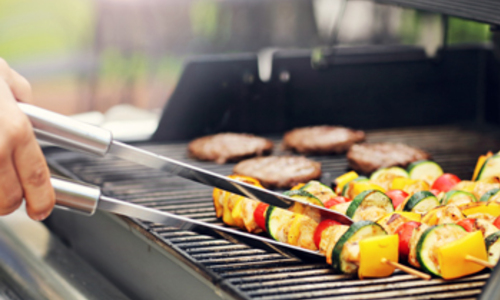5-minute read
|
PGS Grill
There’s something inherently American about firing up the grill and gathering around it with friends and family. Even if you’re living in a condo or apartment building, there’s still a sense of belonging when the summer grilling season rolls around. In this post, we’ll explore the cultural significance of grilling in America, along with some essential safety tips and techniques tailored for communal settings.
Gas grills are the most popular type of outdoor grill, thanks to their convenience. Unlike charcoal grills, which require more prep work and cleanup, gas grills can be ignited with the flick of a switch and run on either propane or natural gas. While some traditionalists argue that charcoal imparts a superior flavor, the difference isn’t as noticeable as many might think.
Gas grills typically come equipped with one to five burners. The cooking surface may consist of stainless steel sheets, porcelain-covered steel rods, stainless steel rods, or iron grates. Top-rated models in this category include the PSG A-Series and T-Series Grills.
The A-Series grills are crafted from permanent mold aluminum, high-quality commercial-grade stainless steel, brass, and porcelain-coated steel components. Prices vary based on the BTU output and cooking area.
The T-Series grills are designed for maximum reliability and safety in a commercial environment. Their durable materials ensure they can handle daily use. A built-in 60-minute gas flow timer automatically shuts off the gas supply if the grill is accidentally left on. This feature prevents potential hazards associated with leaving the gas running unattended.
California’s mild climate makes it ideal for outdoor cooking, especially for those living in apartments. However, it’s crucial to follow local regulations regarding the use of grills on patios and balconies. According to the California Fire Code:
Of course, knowing how to operate the equipment safely is paramount. According to the National Fire Incident Reporting System, misuse of equipment and operational errors account for 47% of grill fires. When using a gas grill, remember these key points:
As a responsible community grill user, remember to clean up thoroughly after your event. Maintaining a tidy, safe, and inviting shared space ensures everyone enjoys the benefits of communal grilling.
A newly acquired commercial grill needs to be "seasoned" before its first use. Properly seasoned grates heat up faster and distribute heat more evenly. Seasoning removes residual contaminants from the manufacturing or shipping process and helps seal the pores of the metal.
The grates that require seasoning include stainless steel or cast iron grates and their emitter plates.
Regular cleaning is also essential. Refer to the owner’s manual for specific instructions. Some commercial grills can be cleaned with a grill brush, while others require specialized cleaners and soap solutions to avoid damage.
There’s nothing quite like biting into a perfectly grilled piece of meat. The foundation of a great barbecue lies in selecting high-quality ingredients. Whether you’re an experienced griller or just starting out, here are three fundamental rules for choosing meats for your next barbecue.
If you’re looking for premium-quality meat, choice-grade beef is an excellent choice. It strikes a balance between affordability and flavor. Prime beef is pricier but worth it, as only two out of every 100 cows produce this grade. Select-grade meat, while cheaper, lacks the depth of flavor offered by higher grades.
There’s no excuse not to master the art of grilling on your community grill. Familiarity with the equipment is only half the battle; knowing your tools is equally important. Essential items include a meat fork, spatula, tongs, cutting board, marinade brush, meat thermometer, and slicing knife.
No barbecue is complete without condiments like sauces, marinades, and spice rubs. With countless options available, you can either purchase pre-made varieties or experiment with homemade recipes. Public grills foster social connections that private setups rarely achieve. So take advantage of your apartment complex’s facilities and host your next barbecue!
Have more questions? Want further information? Get in touch with us today—we’d love to assist you! audi blind spot assist,blind spot detection system,blind spot warning,blind spot warning system Shenzhen Zhitong Yingchuang Electronic Technology Co., Ltd. , https://www.visualdriving.comGrilling Together: The Joy of Outdoor Cooking in Shared Spaces

Did You Know These BBQ Facts?
Why Gas Grills Dominate the Market
PSG also provides customizable options such as access doors, drawer storage sets, and beverage centers for their grills.
Grilling Safety Tips for Apartment Living
Seasoning Your Commercial Grill
Choosing the Right Meat for Grilling
Get Ready for BBQ Season
Outdoor Grilling in a Community
Return to Blog